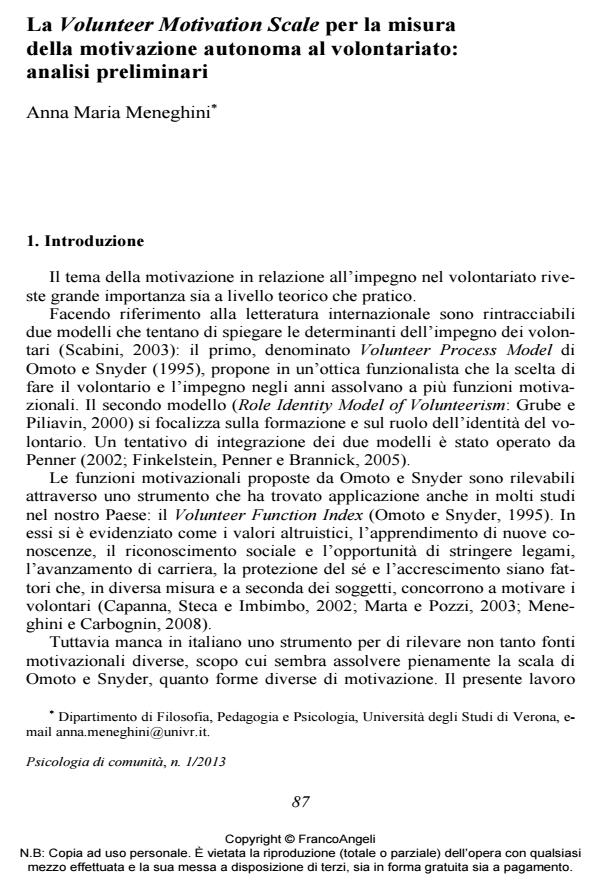La Volunteer Motivation Scale per la misura della motivazione autonoma al volontariato: analisi preliminari
Titolo Rivista PSICOLOGIA DI COMUNITA’
Autori/Curatori Anna Maria Meneghini
Anno di pubblicazione 2013 Fascicolo 2013/1
Lingua Italiano Numero pagine 12 P. 87-98 Dimensione file 976 KB
DOI 10.3280/PSC2013-001008
Il DOI è il codice a barre della proprietà intellettuale: per saperne di più
clicca qui
Qui sotto puoi vedere in anteprima la prima pagina di questo articolo.
Se questo articolo ti interessa, lo puoi acquistare (e scaricare in formato pdf) seguendo le facili indicazioni per acquistare il download credit. Acquista Download Credits per scaricare questo Articolo in formato PDF

FrancoAngeli è membro della Publishers International Linking Association, Inc (PILA), associazione indipendente e non profit per facilitare (attraverso i servizi tecnologici implementati da CrossRef.org) l’accesso degli studiosi ai contenuti digitali nelle pubblicazioni professionali e scientifiche.
Molte ricerche relative alla motivazione dei volontari si sono focalizzate sulle diverse funzioni motivazionali che il volontariato assolve; minor attenzione è stata dedicata al grado di autonomia della motivazione dei volontari. Facendo riferimento alla Self Determination Theory, Millette e Gagnè (2008) hanno creato la Volunteer Motivation Scale: si tratta di uno strumento self-report che rileva il livello di autonomia versus regolazione esterna della motivazione dei volontari. Poiché in lingua italiana sembra mancare uno strumento di questo tipo, la presente ricerca mostra i primi risultati scaturiti dalla somministrazione della traduzione italiana della scala di Millette e Gagnè ad un gruppo di 247 volontari.
Parole chiave:Volontariato, regolazione della motivazione, motivazione autonoma, Self Determination Theory, Relative Autonomy Index, soddisfazione.
- The Volunteer Motivation Scale (VMS): Adaptation and Psychometric Properties among a Portuguese Sample of Volunteers Cátia Martins, Saul Jesus, José Tomás da Silva, Conceição Ribeiro, Maria Dulce Estêvão, Helena Mocho, Elias Ratinho, Cristina Nunes, in Sustainability /2023 pp.327
DOI: 10.3390/su16010327 - Volunteer Motivation and Organizational Climate: Factors that Promote Satisfaction and Sustained Volunteerism in NPOs Alessio Nencini, Diego Romaioli, Anna Maria Meneghini, in Voluntas: International Journal of Voluntary and Nonprofit Organizations /2016 pp.618
DOI: 10.1007/s11266-015-9593-z
Anna Maria Meneghini, La Volunteer Motivation Scale per la misura della motivazione autonoma al volontariato: analisi preliminari in "PSICOLOGIA DI COMUNITA’" 1/2013, pp 87-98, DOI: 10.3280/PSC2013-001008